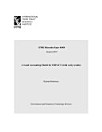Landscape complexity as determined by socioeconomic trends, climate change, and broad agricultural policies: A study on multifunctional landscapes
Cenacchi, Nicola · Petsakos, Athanasios · Robertson, Richard D. · Song, Chun · Mishra, Abhijeet
iyl, 2025 · IFPRI Discussion Papers 2343-kitob · Intl Food Policy Res Inst
E-kitob
55
Sahifalar soni
family_home
Yaroqli
info
reportReytinglar va sharhlar tasdiqlanmagan Batafsil
Bu e-kitob haqida
Food systems face dire challenges, including climate change, biodiversity loss, and resource overuse. To ensure their long-term sustainability and resilience they need urgent transformation, while continuing to support livelihoods and address rising food insecurity. The design and management of multifunctional agricultural landscapes offer a pathway to address these challenges; and improved understanding of landscape complexity, including a diverse mix of natural and cropland covers, can help advance achievement of multiple food system goals. As land managers and decision makers plan for the future of our landscapes, they need to recognize that powerful forces outside their control will have a strong influence on the final outcome. This study explores the interplay between global drivers—such as population growth, economic trends, climate change—and landscape complexity, using a modeling system linking a global agricultural economic model to a land-use model. Global trends are described, and Kenya serves as a case study, representing broader local dynamics. Results indicate that the majority of agricultural landscapes, globally and in Kenya, are projected to experience increased complexity by 2050, primarily through cropland expansion at the expense of natural habitats. However, there are a few instances where an expansion in cropland may be liked to a decrease in landscape complexity. Patterns also vary under alternative scenarios of agricultural development. Where greater complexity is achieved through policies that further concentrate agricultural land in some areas, this is mainly associated with net gains in natural habitats and a contraction of cropland. Overall, this preliminary research underscores the need for integrated landscape management and more comprehensive scenarios to inform sustainable land-use planning aligned with global food security and environmental objectives.
Bu e-kitobni baholang
Fikringizni bildiring.
Qayerda o‘qiladi
Smartfonlar va planshetlar
Android va iPad/iPhone uchun mo‘ljallangan Google Play Kitoblar ilovasini o‘rnating. U hisobingiz bilan avtomatik tazrda sinxronlanadi va hatto oflayn rejimda ham kitob o‘qish imkonini beradi.
Noutbuklar va kompyuterlar
Google Play orqali sotib olingan audiokitoblarni brauzer yordamida tinglash mumkin.
Kitob o‘qish uchun mo‘ljallangan qurilmalar
Kitoblarni Kobo e-riderlar kabi e-siyoh qurilmalarida oʻqish uchun faylni yuklab olish va qurilmaga koʻchirish kerak. Fayllarni e-riderlarga koʻchirish haqida batafsil axborotni Yordam markazidan olishingiz mumkin.








